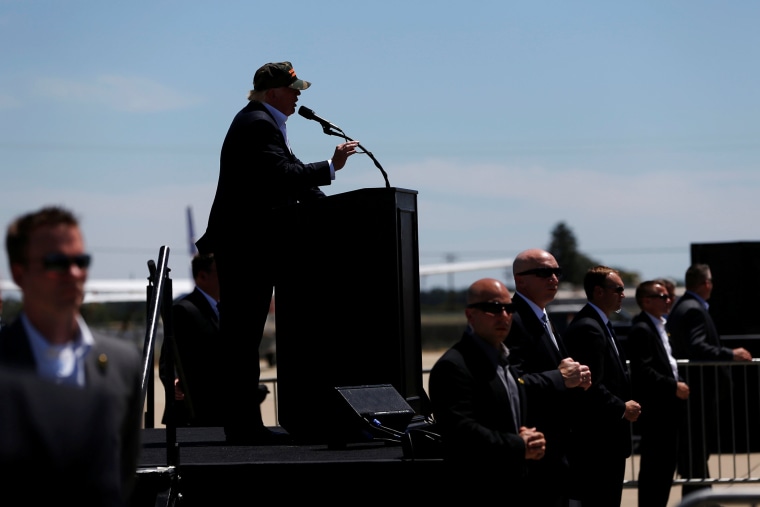The first time Donald Trump's reliance on private security drew real scrutiny came in March. The Republican candidate was hosting a rally in North Carolina, where Trump urged his followers to raise their hand and take an oath to support his campaign, but while this bizarre pledge was unfolding, undercover "private intelligence officers" moved through the crowd, looking for potential protestors.A member of Trump's private security team later told reporters that he and his colleagues were doing "intelligence work" while "assisting" law-enforcement personnel. By September, the then-candidate had reportedly spent hundreds of thousands of dollars on private security, even after Trump received protection from the U.S. Secret Service.After the election, I had largely assumed these practices would end. Then I read this unsettling Politico article.
President-elect Donald Trump has continued employing a private security and intelligence team at his victory rallies, and he is expected to keep at least some members of the team after he becomes president, according to people familiar with the plans.The arrangement represents a major break from tradition. All modern presidents and presidents-elect have entrusted their personal security entirely to the Secret Service, and their event security mostly to local law enforcement, according to presidential security experts and Secret Service sources.
The piece added that Trump has "opted to maintain an aggressive and unprecedented private security force," even now, more than a month after he became president-elect.Jonathan Wackrow, a former Secret Service agent who worked on President Obama's protective detail during the 2012 campaign, told Politico, "It's playing with fire." Wackrow added that such a dynamic -- having a private security team working events with Secret Service simultaneously -- "increases the Service's liability, it creates greater confusion and it creates greater risk."I can appreciate why some tire of the "this is not normal" description of Trump's behavior, but this is not normal. There is no modern precedent for a president-elect accepting Secret Service protection and maintaining a private security detail.How this might work in the White House is not at all clear, though Politico's piece noted that Keith Schiller, Trump's longtime director of private security, "is expected to become a personal White House aide who would serve as the incoming president's full-time physical gatekeeper."Trump's authoritarian instincts have long been one of the scariest aspects of his rise to power. His embrace of a private security force isn't helping matters.Postscript: If you poke around Google a bit, you'll notice that many of President Obama's critics have fretted for years about Obama creating a private security force of his own. That, in reality, never actually happened -- though I'll be eager to see how many of those who feared such a policy respond to the Trump news.
